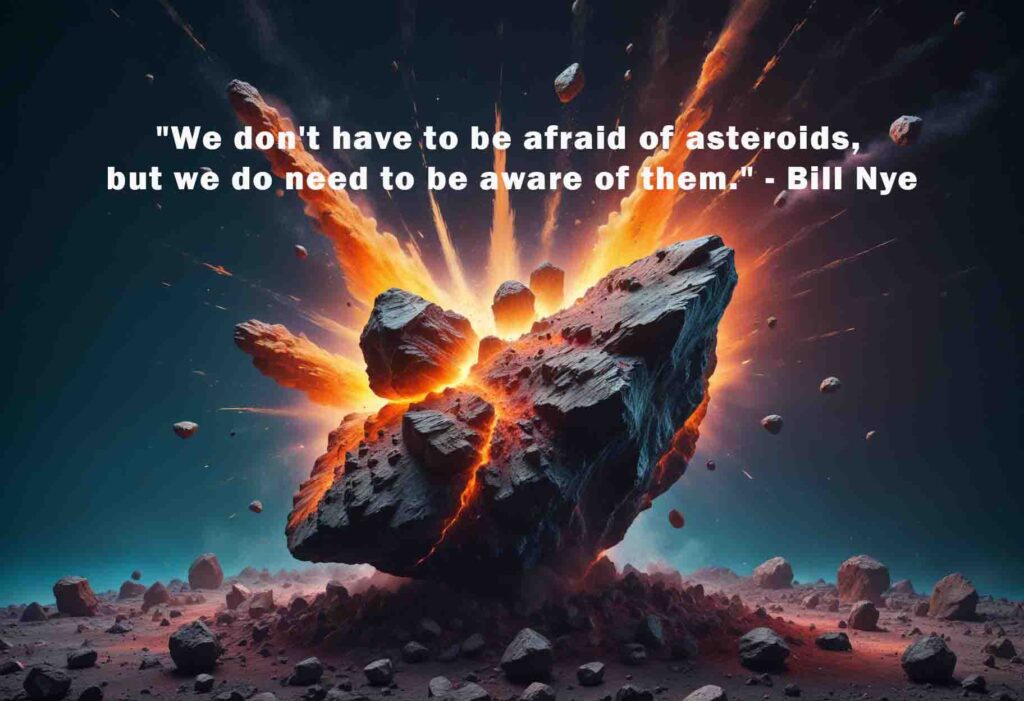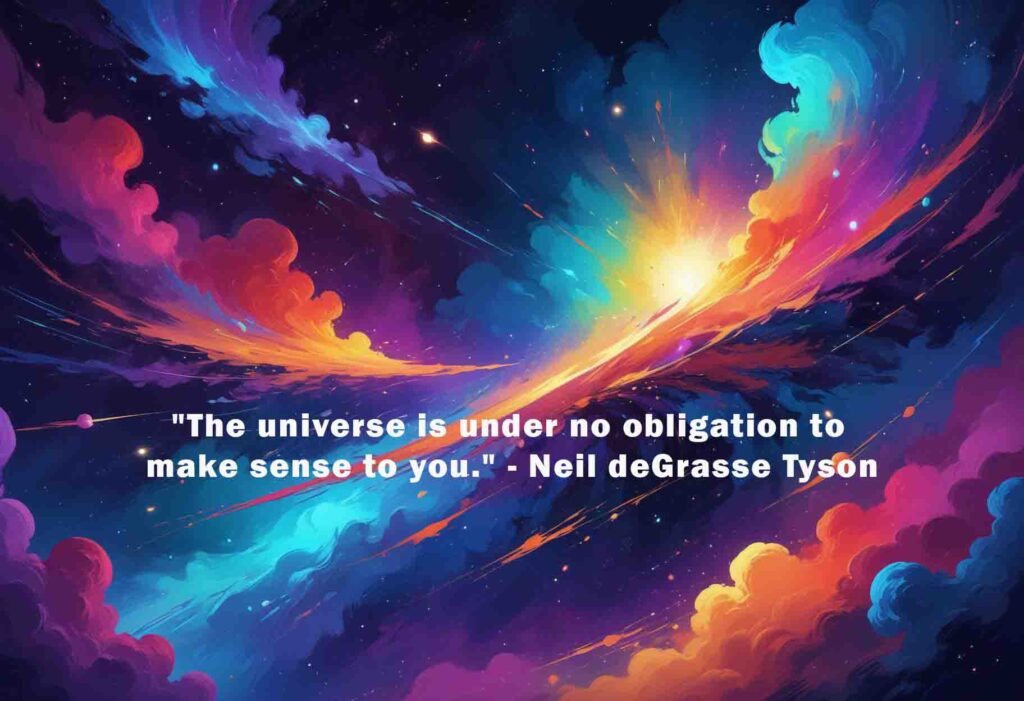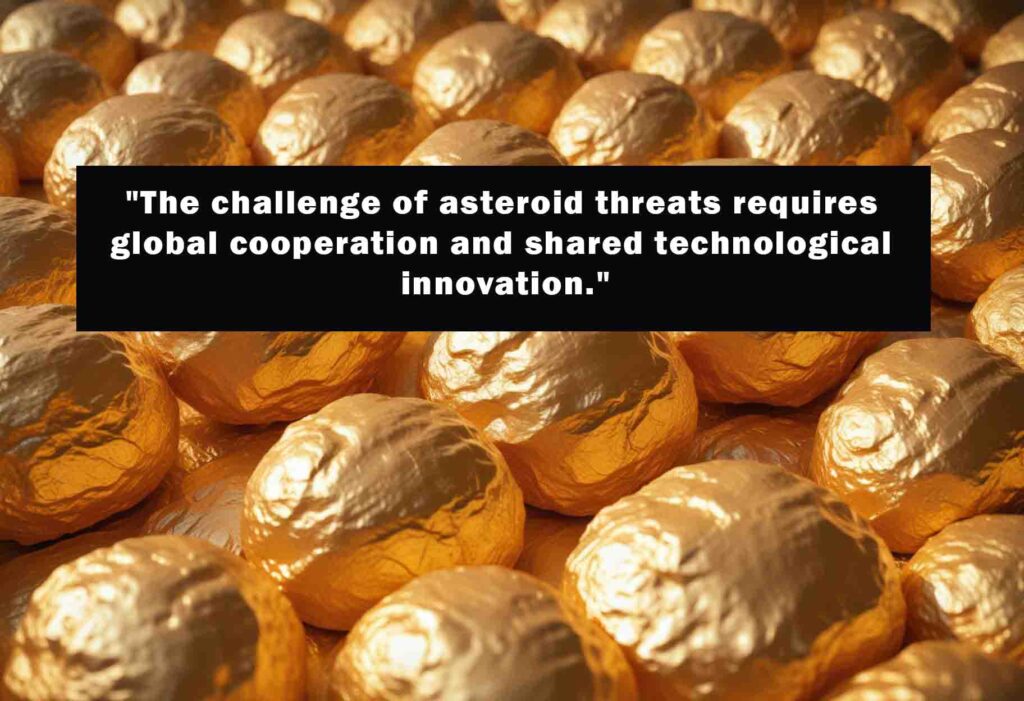Introduction: Embracing the Mystery of Asteroids
“We don’t have to be afraid of asteroids, but we do need to be aware of them.” – Bill Nye
Every year on June 30th, the world comes together to celebrate World Asteroid Day, a day dedicated to raising awareness about asteroids and their potential impact on our planet. This observance is an opportune moment to delve into the captivating realm of these celestial bodies through a collection of inspiring quotes that reflect the awe and curiosity they evoke.
Asteroids, often referred to as “minor planets,” are remnants from the early solar system that offer invaluable insights into the universe’s formation. Their significance spans both scientific research and public awareness, emphasizing the importance of understanding and monitoring these space rocks. Embracing the mystery of asteroids not only enhances our knowledge of the cosmos but also underscores the necessity of preparedness for any potential threats they may pose.
World Asteroid Day serves as a reminder of our fascination with space and the endless possibilities it holds. By exploring astronomy quotes, asteroid quotes, and space exploration quotes, we can appreciate the profound impact of these celestial objects on our understanding of the universe. Through the wisdom of scientists, astronomers, and thought leaders, we gain a deeper appreciation for the beauty and complexity of space, inspiring us to continue our pursuit of knowledge.
As we celebrate this special day, let us reflect on the inspirational quotes that capture the essence of scientific discovery and the wonder of the cosmos. These words not only motivate us to look beyond our earthly confines but also to embrace the challenges and opportunities that lie in the vast expanse of space. World Asteroid Day reminds us that the universe is full of mysteries waiting to be unraveled, and it is through our collective curiosity and dedication that we can unlock the secrets of the stars.

Scientific Discovery: Asteroids Through the Eyes of Scientists
“Imagination will often carry us to worlds that never were, but without it we go nowhere.” – Carl Sagan. This powerful quote by Carl Sagan, a renowned astrophysicist and science communicator, underscores the importance of imagination in scientific discovery. Sagan’s work in planetary science, particularly his contributions to our understanding of the asteroid belt, emphasizes how the ability to envision the unknown drives the pursuit of knowledge. His imaginative approach has inspired countless researchers to delve deeper into the mysteries of asteroids and other celestial bodies.
“The universe is under no obligation to make sense to you.” – Neil deGrasse Tyson. Neil deGrasse Tyson, an eminent astrophysicist, reminds us that the cosmos operates beyond human comprehension. This quote highlights the enigmatic nature of asteroids and the ongoing quest to decode their secrets. Tyson’s work in popularizing space science has brought attention to the complexities of asteroid formation, composition, and potential impact on Earth, encouraging a broader public interest and understanding of these celestial objects.
“The study of asteroids is crucial for our understanding of the early solar system.” – Jane Luu. Jane Luu, an astronomer known for her co-discovery of the Kuiper Belt, emphasizes the significance of asteroids in piecing together the history of our solar system. Her research has shown that asteroids are not just space debris but hold vital clues about the conditions and processes that prevailed during the solar system’s formation. Luu’s work underscores the importance of studying these objects to gain insights into the origins of our cosmic neighborhood.
“Asteroids are like time capsules from the early solar system.” – Dante Lauretta. Dante Lauretta, the principal investigator of the OSIRIS-REx mission, draws attention to the value of asteroids as repositories of ancient materials. His analogy of asteroids as “time capsules” encapsulates their role in preserving pristine samples from the dawn of the solar system. The OSIRIS-REx mission’s exploration of the asteroid Bennu aims to unlock these secrets, providing invaluable data that can enhance our understanding of planetary formation and the potential for life elsewhere in the universe.
These quotes from prominent scientists illustrate the profound curiosity and dedication that drive the study of asteroids. Their insights and discoveries continue to inspire new generations of researchers to explore the vast, uncharted territories of space, contributing to our ever-expanding knowledge of the universe.

The Wonder of Space Exploration: Asteroids in the Cosmos
The realm of space exploration has always sparked a profound sense of wonder and curiosity. Asteroids, in particular, serve as celestial time capsules, providing invaluable insights into the early solar system. As Carl Sagan aptly put it, “Somewhere, something incredible is waiting to be known.” This quote encapsulates the spirit of discovery that drives missions like NASA’s OSIRIS-REx, which aimed to retrieve samples from the asteroid Bennu. The mission’s success not only brought back physical samples but also expanded our understanding of these primordial bodies.
Asteroids, though often seen as mere space rocks, hold a significant place in the broader narrative of our journey into space. Elon Musk, a visionary in the field of space exploration, once remarked, “When something is important enough, you do it even if the odds are not in your favor.” This resonates deeply with the efforts of space agencies and scientists who take on the formidable challenge of studying and exploring these distant objects.
Quotes from astronauts also illuminate the awe-inspiring aspects of asteroid missions. For instance, astronaut Chris Hadfield noted, “To see a world in a grain of sand and a heaven in a wildflower, hold infinity in the palm of your hand and eternity in an hour.” This poetic reflection mirrors the intricate beauty and mystery that asteroids embody. They are small, yet they hold the vast history of the cosmos within them.
The European Space Agency’s Rosetta mission, which successfully landed the Philae probe on comet 67P/Churyumov-Gerasimenko, demonstrated the remarkable advancements in our ability to study these space objects. As Thomas Pesquet, a French astronaut, said, “Space exploration is a force of nature unto itself that no other force in society can rival.” This speaks to the unparalleled drive and ambition that underpin missions to asteroids and comets.
In the grand tapestry of space exploration, asteroids serve not only as subjects of scientific inquiry but also as sources of inspiration. Their study propels us to look beyond our terrestrial confines and envision a future where humanity reaches further into the cosmos.

The Potential Impact: Asteroids and Our Future
Asteroids, those celestial bodies that traverse our solar system, hold a dual significance for humanity—both as subjects of scientific inquiry and as potential harbingers of global change. As we celebrate World Asteroid Day, it’s crucial to delve into the multifaceted impact these space rocks could have on our future. Asteroids, while often perceived as threats, also represent opportunities for advancement in science and technology.
The potential risks posed by asteroids cannot be underestimated. Renowned physicist Stephen Hawking once remarked, “Asteroids are nature’s way of asking, ‘How’s that space program coming along?'” This quote underscores the urgent need for continuous monitoring and research efforts to predict and prevent possible collisions. Historical events, such as the Tunguska event in 1908 and the Chelyabinsk meteor in 2013, serve as stark reminders of the devastation that can be wrought by these celestial visitors.
On the other hand, asteroids offer a wealth of scientific opportunities. They are time capsules, preserving information about the early solar system. NASA’s OSIRIS-REx mission, which aims to return samples from the asteroid Bennu, exemplifies the value of these space rocks in enhancing our understanding of planetary formation and the origins of life. Carl Sagan eloquently expressed this sentiment: “The study of asteroids is a window into our own past and a guide to our future.”
Policymakers and contemporary experts in planetary defense emphasize the importance of international collaboration in addressing asteroid threats. As former NASA Administrator Charles Bolden noted, “The challenge of asteroid threats requires global cooperation and shared technological innovation.” This collaborative approach is essential for developing effective strategies to detect, track, and deflect potentially hazardous asteroids.

Ultimately, the dual nature of asteroids—both as risks and as objects of profound scientific interest—highlights the necessity of continued vigilance and research. In the words of Neil deGrasse Tyson, “We are all connected; to each other, biologically; to the Earth, chemically; to the rest of the universe, atomically.” This quote serves as a powerful reminder of our shared responsibility to safeguard our planet while pursuing the boundless possibilities of space exploration.








